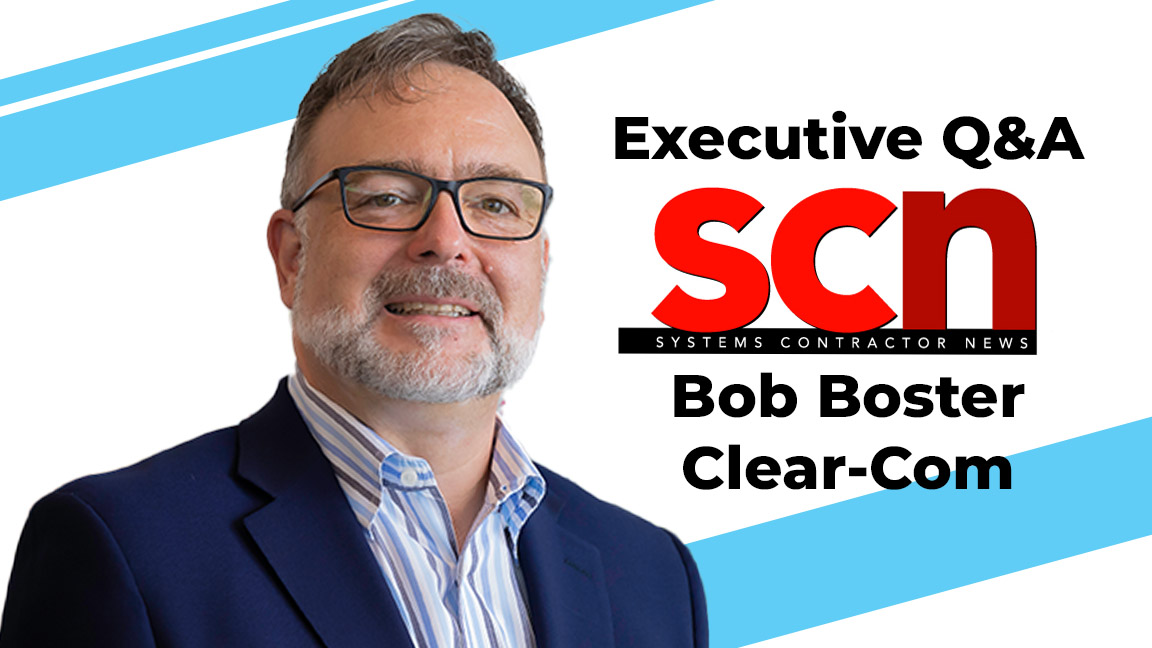SCN: How long have you been with Clear-Com, and what are your responsibilities?
Bob Boster: I’m in my 18th year with Clear-Com. As president I have a wide range of responsibilities, but I’m deeply engaged with our customers as well as visioning the next innovations we will be bringing to them.
[Executive Q&A: On Point and On Budget]
SCN: Your intercom solutions are in use in broadcast and live events, but what are some of the other vertical markets you serve?
BB: We have a very wide range of users in different segments, but some of the other major ones are military, aerospace, corporate, industrial (both on land and in the sea), HOW, education, film and media production, and utilities.

SCN: There are so many choices these days, but are good ol’ fashioned analog partyline intercom systems still a thing?
BB: Great question. The simple answer is yes—and the reason is that the cost and complexity profile of simply throwing down a microphone cable and plugging a few things together that allow you to talk is hard to argue with in a universe where configuring IP addresses and resetting switches has become so common. We can deliver the same functionality in a lot of different ways, but the simplicity, sound quality, and frankly the elegance of one cable/one channel is still a really great fit for many applications.
SCN: What’s more popular these days, wired or wireless intercom systems?
BB: We have always sold hybrid systems which support a combination of wired and wireless users at a given site, and that remains quite common. However, we now frequently provide links connecting multiple sites together over IP and have started to see our virtual intercom apps become a common addition to the product mix.
[Oregon State University Turns to Clear-Com to Enhance Collaboration]
SCN: How has audio-over-IP impacted your intercom product line?
BB: Clear-Com and Trilogy (now a part of the CC family) were the two originators of intercom-over-IP, so we’ve been bringing IP to the table for years. The incorporation of IP into the intercom portfolio has now grown to be a part of almost everything we do, but the challenge of keeping the actual beltpack-wearing end user from having to deal with the complexity of the system around them is something we work very hard at. Our current product, Arcadia, is a good example of all that intercom-over-IP power brought into a single system that still keeps the complexity down for the end users.
SCN: How is Gen-IC, your new virtual intercom, unique in the industry?
BB: Gen-IC is unique in a couple of ways. First of all, it leverages all the experience we’ve had with our Agent-IC mobile app and Station-IC desktop app by simply moving those onto a cloud platform for all the power it offers. So you have a proven, mature endpoint being paired with our patented "mixing" technology sitting in a high-availability, low-latency data center. Second, our solution supports our LQ IP intercom appliance as a connection to hardware intercoms, either ours or units from other manufacturers. This combo is very compelling and has facilitated some really interesting events already, such as the New Year's Eve ball drop in New York City and the 2024 NFL draft coverage.
SCN: Is Gen-IC designed to be an everyday tool or is it more for events with surging intercom requirements?
BB: I think it’s going to end up being both. More and more of our users are finding that one or a few sites with a dedicated hardware intercom needs to support a geographically distributed team in addition to the local users. This scenario really took off during COVID-19 and definitely has continued from there. Some of those remote users represent "surge capacity," but some of it is needed all the time. Gen-IC is going to fill that need for a lot of users. Additionally, some parts of our business are moving more quickly to a largely cloud-based production environment, and Gen-IC is the natural solution for those users as well.
More and more of our users are finding that one or a few sites with a dedicated hardware intercom needs to support a geographically distributed team in addition to the local users.
SCN: What features do you need to make a good intercom headset?
BB: This is a great question with, frankly, a lot contradictory details in it. Some people need something lightweight and as close to invisible as possible. Others need isolation, which implies some weight and heft. Key commonalities are comfort at the contact points with your head, directionality of the microphone, generally rugged design for storage and transportation, and field serviceability.
SCN: Single-ear or double-ear—what’s your preference and what seems to be the more popular option in the field?
BB: Like many people from a theatrical background, I grew up with a single-ear headset as the standard. This is the most popular as well. However, as we start to get into some newer technologies, it will be interesting to see what trends develop. Bone conduction is an interesting development, and it supplies the possibility of situational awareness greater than single-ear while still maintaining intercom inclusion. Watch this space!
[Editorial: AI Can Help Us All Be Lions]
SCN: What are some important details to consider when purchasing an intercom system?
BB: Let’s assume for the sake of time I can skip all the things one would consider for any technology purchase like cost, reliability, service, etc. After those points, I think the complexity of managing the system (configuring, changing, and integrating other voice systems like phones and radios) is a key distinguishing characteristic. Another is the evolution path—does it seem like you can easily add to your existing system to bring newer technology into your operation when needed, or are you facing the decision to dump what you have and start over? Lastly, does the company appear to be continuing to focus on development of new technology? In an ever-changing world, you want your supplier to continue to move with the times.

